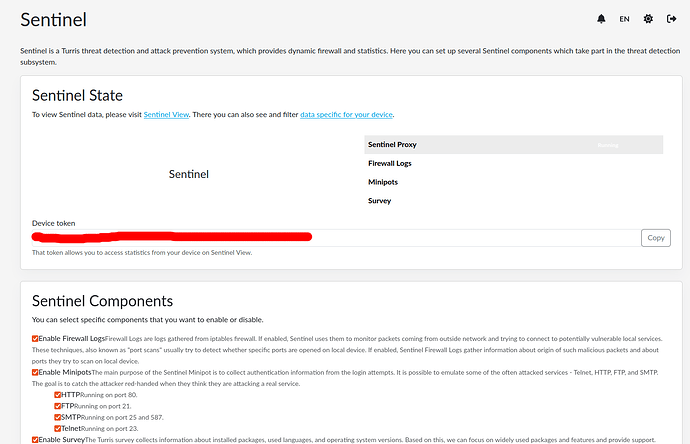7.0.3 → 7.1.0 RC1 update okay. No noticeable cable/wifi/internet interruption. Restart was needed.
Internet was working even after the update but before reboot.
Transmission is still hogging CPU.
Turris Omnia 2017, 1 GB RAM, dead eMMC, system running from mSATA SSD, original wifi cards, UBoot 2022.10. Storage plugin enabled, LXC containers, tor relay, USB HDD shared over samba4 and minidlna, Syncthing, SQM, Hardwario gateway + MQTT IoT bridge, OpenVPN, PPtP VPN, Strongswan IKEv2 VPN, morce.
For Reforis to look nice, I had to delete browser caches (Ctrl+F5). Before I did that, Reforis looked like this:
Another visual glitch (that’s not corrected by cache deleting) is in the darkmode:

vs

I.e. no indication of empty ports.
I had to do some adjustments for manually added iptables rules I had for PPtP VPN
I converted these:
iptables -A input_rule -i ppp1 -j ACCEPT
iptables -A forwarding_rule -i ppp1 -j ACCEPT
iptables -A forwarding_rule -o ppp1 -j ACCEPT
iptables -A output_rule -o ppp1 -j ACCEPT
to /etc/config/firewall:
config rule
option direction 'in'
option target 'ACCEPT'
option device 'ppp1'
option src '*'
option name 'PPTP ppp1 in'
list proto 'all'
config rule
list proto 'all'
option name 'PPTP ppp1 forward in'
option target 'ACCEPT'
option device 'ppp1'
option dest '*'
option src '*'
option direction 'in'
config rule
list proto 'all'
option name 'PPTP ppp1 forward out'
option target 'ACCEPT'
option device 'ppp1'
option dest '*'
option src '*'
option direction 'out'
config rule
option direction 'out'
option target 'ACCEPT'
option device 'ppp1'
option dest '*'
option name 'PPTP ppp1 out'
list proto 'all'
fail2ban package still brings in dependency on iptables. I’ve reported that upstream: fail2ban still depends in iptables · Issue #25163 · openwrt/packages · GitHub .
I also updated GitHub - peci1/fail2ban_openwrt: OpenWRT support for fail2ban to reflect the switch over to nftables, making PPtP jail working again (and I also use the default distributed OpenVPN jail). In the jails, I had to change not only banaction, but also protocol from all to tcp, udp - otherwise, fail2ban failed to start the jails due to nft syntax error.
![]()


